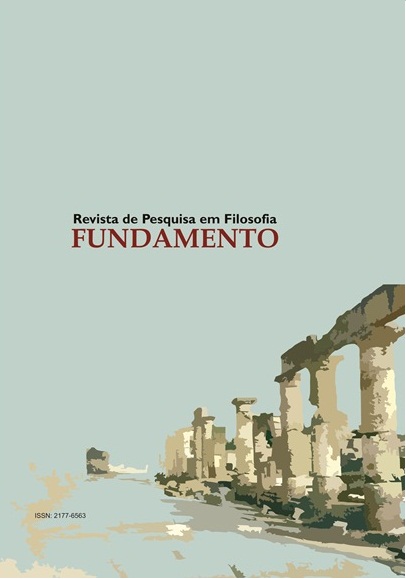Uma solução contextualista para o Problema da Vingança
Resumo
Meu objetivo neste artigo é apresentar e defender uma solução contextualista do Paradoxo do Mentiroso baseada no framework da Teoria de Situações. Soluções contextualistas, de modo geral, relativizam atribuições de verdade a contextos, o que permite tratar as sentenças mentirosas como expressando ambiguamente diferentes proposições em relação a diferentes contextos. O grande desafo das soluções contextualistas consiste em bloquear o Problema da Vingança. Para isto, elas precisam impor certas restrições de universalidade. O que pretendo fazer aqui é apresentar uma solução contextualista desenvolvida no framework da Teoria de Situações de Barwise & Ecthemendy (1987), justifcar as restrições de universalidade impostas por ela e, fnalmente, mostrar como tal solução poderia evitar o Problema da VingançaReferências
Austin, J. L., (1950), “Truth”, Proceedings of the Aristotelian Society (Supplementary
Guilherme Araújo Cardoso
FUNDAMENTO – Revista de Pesquisa em Filosofa, n. 13, jul-dez - 2016
94
Volume), 24: 111–129.
Barwise, J. and Etchemendy, J. (1987), Te Liar, Oxford: Oxford University Press.
Beall, J. C. (ed.), (2007), Revenge of the Liar, Oxford: Oxford University Press.
Gauker, C., (2006), “Against stepping back: A critique of contextualist approaches to the
semantic paradoxes”, Journal of Philosophical Logic, 35(4): 393–422.
Glanzberg, M. (2004), “A contextual-hierarchical approach to truth and the Liar
paradox”, Journal of Philosophical Logic, 33(1): 27–88.
_____, (2006), “Context and unrestricted quantifcation”, in Rayo and Uzquiano (2006):
45–74.
Kripke, S., (1975), “Outline of a theory of truth”, Journal of Philosophy, 72(19): 690–716.
Priest, G. (1984), “Hyper-contradictions”, Logique & Analyse, 27(107): 237-243.
Rayo, A. and Uzquiano, G. (eds.), (2006), Absolute Generality, Oxford: Oxford University
Press.
Simmons, K. (2007), “Revenge and Context”, in Beall (2007): 345-367.
Tarski, A., (1935), “Te Concept of Truth in Formalized Languages”, in Logic, Semantics,
Metamathematics, Indianapolis: Hacket 1983, 2d edition, 152–278.
Guilherme Araújo Cardoso
FUNDAMENTO – Revista de Pesquisa em Filosofa, n. 13, jul-dez - 2016
94
Volume), 24: 111–129.
Barwise, J. and Etchemendy, J. (1987), Te Liar, Oxford: Oxford University Press.
Beall, J. C. (ed.), (2007), Revenge of the Liar, Oxford: Oxford University Press.
Gauker, C., (2006), “Against stepping back: A critique of contextualist approaches to the
semantic paradoxes”, Journal of Philosophical Logic, 35(4): 393–422.
Glanzberg, M. (2004), “A contextual-hierarchical approach to truth and the Liar
paradox”, Journal of Philosophical Logic, 33(1): 27–88.
_____, (2006), “Context and unrestricted quantifcation”, in Rayo and Uzquiano (2006):
45–74.
Kripke, S., (1975), “Outline of a theory of truth”, Journal of Philosophy, 72(19): 690–716.
Priest, G. (1984), “Hyper-contradictions”, Logique & Analyse, 27(107): 237-243.
Rayo, A. and Uzquiano, G. (eds.), (2006), Absolute Generality, Oxford: Oxford University
Press.
Simmons, K. (2007), “Revenge and Context”, in Beall (2007): 345-367.
Tarski, A., (1935), “Te Concept of Truth in Formalized Languages”, in Logic, Semantics,
Metamathematics, Indianapolis: Hacket 1983, 2d edition, 152–278.
Publicado
2018-01-22
Como Citar
Cardoso, G. A. (2018). Uma solução contextualista para o Problema da Vingança. Virtualia Journal, 1(13). Recuperado de https://periodicos.ufop.br/virtualia-journal/article/view/2457
Seção
ARTIGOS INÉDITOS


.jpg)
